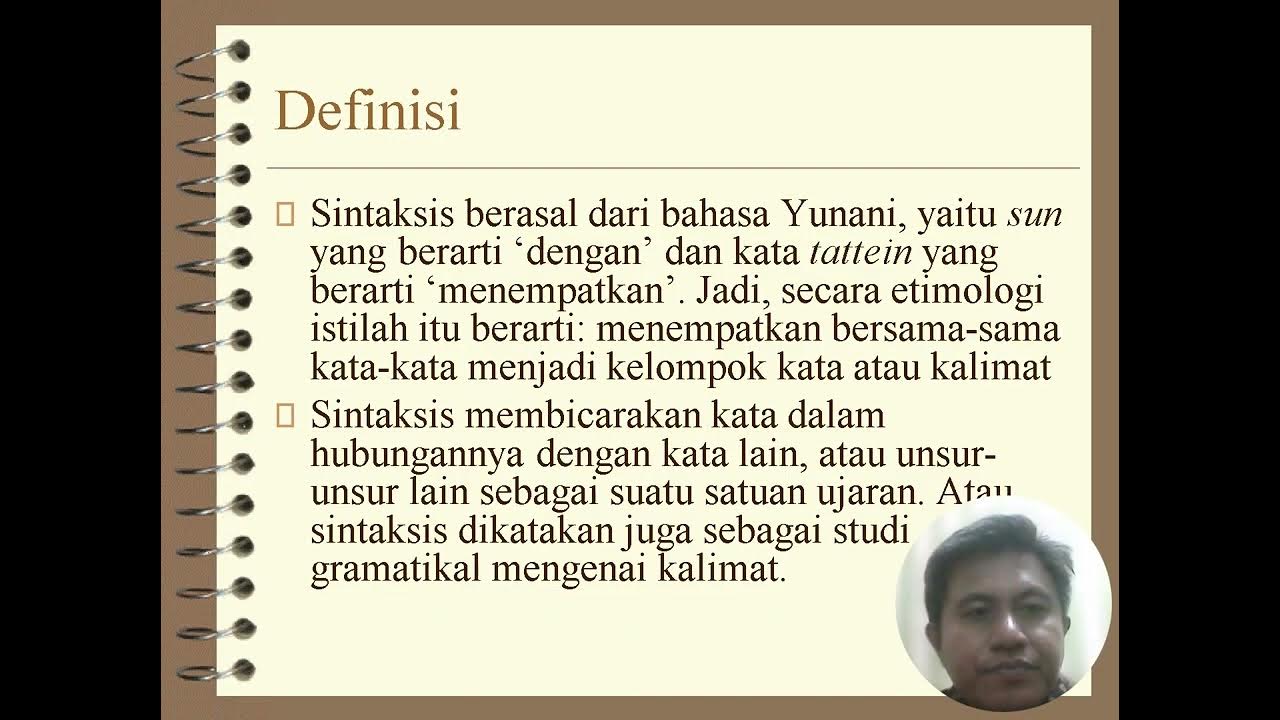Syntax versus Grammar
Summary
TLDRIn this video, the host clarifies the distinction between syntax and grammar, explaining that while syntax pertains to the structure of sentences, grammar encompasses syntax plus morphology, which deals with word formation. The discussion highlights how different languages can be categorized as analytic or synthetic based on their reliance on syntax or morphology. The host also notes the historical shift of certain languages, like English and Persian, from being morphology-heavy to more syntax-driven. This insight into linguistic structure underscores the complexities of language evolution and typology.
Takeaways
- 😀 Syntax and grammar are not the same; syntax is a component of grammar.
- 😀 Grammar encompasses syntax plus morphology, explaining how words are structured and formed.
- 😀 Syntax focuses on how words are combined to create well-formed sentences.
- 😀 Morphology deals with the internal structure and formation of words.
- 😀 Intonation, while important, falls under phonology and is not included in syntax.
- 😀 Analytic languages have less morphology and rely more on syntax, using more words.
- 😀 Synthetic languages feature heavier morphology, often conveying information within the word itself.
- 😀 Language typology categorizes languages based on their morphological and syntactical characteristics.
- 😀 Some languages evolve from being morphology-heavy to syntax-heavy over time.
- 😀 Examples of languages that have shifted to being more analytic include English and Persian.
Q & A
What is the main difference between syntax and grammar?
-Syntax is a part of grammar that deals with the structure of sentences, while grammar encompasses syntax plus additional components such as morphology.
How does the definition of grammar vary?
-Grammar can be defined in various ways, but the most common definition is that it consists of both syntax and morphology.
What does syntax specifically address in a language?
-Syntax explains how words are combined to form well-formed sentences.
What role does morphology play in grammar?
-Morphology concerns the structure of words and how they are formed, including aspects like prefixes and suffixes.
What is the relationship between intonation and syntax?
-Intonation is an aspect of language that functions beyond the word level but belongs to phonology, not syntax.
What are analytic and synthetic languages?
-Analytic languages have less morphology and rely more on syntax, while synthetic languages feature heavier morphology, where grammatical information is often contained within the words themselves.
Can languages change from synthetic to analytic over time?
-Yes, some languages that were once morphology-heavy can evolve to become more analytic and syntax-heavy, as seen in the evolution of English and Persian.
What does it mean for a language to be 'morphology heavy'?
-A morphology-heavy language has a complex system of word formation and often includes grammatical information like cases directly within the words.
How do languages balance syntax and morphology?
-Languages typically maintain a balance between syntax and morphology, but the degree can vary significantly, leading to different typologies.
What historical changes occurred in Indo-European languages regarding morphology?
-Many Indo-European languages were once very morphology-heavy with numerous cases but have lost much of this complexity over time, becoming more syntax-focused.
Outlines

Cette section est réservée aux utilisateurs payants. Améliorez votre compte pour accéder à cette section.
Améliorer maintenantMindmap

Cette section est réservée aux utilisateurs payants. Améliorez votre compte pour accéder à cette section.
Améliorer maintenantKeywords

Cette section est réservée aux utilisateurs payants. Améliorez votre compte pour accéder à cette section.
Améliorer maintenantHighlights

Cette section est réservée aux utilisateurs payants. Améliorez votre compte pour accéder à cette section.
Améliorer maintenantTranscripts

Cette section est réservée aux utilisateurs payants. Améliorez votre compte pour accéder à cette section.
Améliorer maintenant5.0 / 5 (0 votes)






